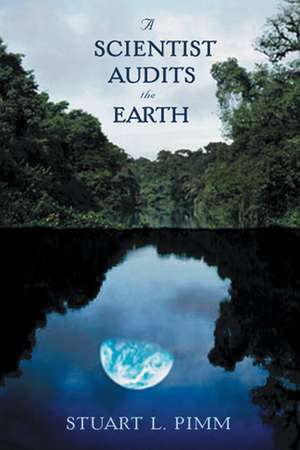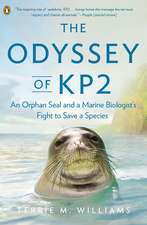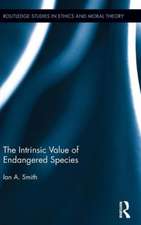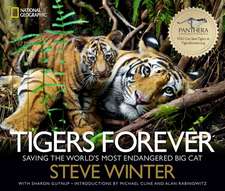A Scientist Audits the Earth
Autor Stuart L Pimmen Limba Engleză Paperback – 2 sep 2004
Humans use 50 percent of the world’s freshwater supply and consume 42 percent of its plant growth. We are liquidating animals and plants one hundred times faster than the natural rate of extinction. Such numbers should make it clear that our impact on the planet has been, and continues to be, extreme and detrimental. Yet even after decades of awareness of our environmental peril, there remains passionate disagreement over what the problems are and how they should be remedied.
Much of the impasse stems from the fact that the problems are difficult to quantify. How do we assess the impact of habitat loss on various species, when we haven’t even counted them all? And just what factors go into that 42 percent of biomass we are hungrily consuming? It is only through an understanding of the numbers that we will be able to break that impasse and come to agreement on which environmental issues are most critical and how they might best be addressed.
Working on the front lines of conservation biology, Stuart Pimm is one of the pioneers whose work has put the “science” in environmental science. In this book, he appoints himself “investment banker of the global, biological accounts,” checking the environmental statistics gathered by tireless scientists in work that is always painstaking and often heartbreaking. With wit, passion, and candor, he reveals the importance of understanding where these numbers come from and what they mean. To do so, he takes the reader on a globe-circling tour of our beautiful, but weary, planet from the volcanic mountains and rainforests of Hawai’i to the boreal forests of Siberia.
At times, the view looks rather grim. Yet Pimm, ever the optimist, presents a world filled with mysterious beauty, the infinite variety of nature, and an urgent hope that through an understanding of our planet’s environmental past and present, we will be inspired to save it from future extinction.
Much of the impasse stems from the fact that the problems are difficult to quantify. How do we assess the impact of habitat loss on various species, when we haven’t even counted them all? And just what factors go into that 42 percent of biomass we are hungrily consuming? It is only through an understanding of the numbers that we will be able to break that impasse and come to agreement on which environmental issues are most critical and how they might best be addressed.
Working on the front lines of conservation biology, Stuart Pimm is one of the pioneers whose work has put the “science” in environmental science. In this book, he appoints himself “investment banker of the global, biological accounts,” checking the environmental statistics gathered by tireless scientists in work that is always painstaking and often heartbreaking. With wit, passion, and candor, he reveals the importance of understanding where these numbers come from and what they mean. To do so, he takes the reader on a globe-circling tour of our beautiful, but weary, planet from the volcanic mountains and rainforests of Hawai’i to the boreal forests of Siberia.
At times, the view looks rather grim. Yet Pimm, ever the optimist, presents a world filled with mysterious beauty, the infinite variety of nature, and an urgent hope that through an understanding of our planet’s environmental past and present, we will be inspired to save it from future extinction.
Preț: 291.11 lei
Nou
Puncte Express: 437
Preț estimativ în valută:
55.71€ • 57.95$ • 45.99£
55.71€ • 57.95$ • 45.99£
Carte tipărită la comandă
Livrare economică 15-29 aprilie
Preluare comenzi: 021 569.72.76
Specificații
ISBN-13: 9780813535401
ISBN-10: 0813535409
Pagini: 304
Dimensiuni: 152 x 229 x 18 mm
Greutate: 0.43 kg
Ediția:None
Editura: Rutgers University Press
Colecția Rutgers University Press
ISBN-10: 0813535409
Pagini: 304
Dimensiuni: 152 x 229 x 18 mm
Greutate: 0.43 kg
Ediția:None
Editura: Rutgers University Press
Colecția Rutgers University Press
Notă biografică
Stuart L. Pimm is Doris Duke Chair of conservation ecology at the Nicholas School of the Environment and Earth Sciences at Duke University. He works to conserve biodiversity in the places it is most threatened, including the Florida Everglades, Central America, Brazil, Southern Africa, and Madagascar. He is the author of more than 150 scientific papers, as well as three books, and numerous articles in publications such as New Scientist, The Sciences, Nature, and Science.
Cuprins
Acknowledgments
Prologue
Part One: Green Forest, Yellow Desert
Billions of Tons of Green Stuff
What Earth Does for Us---And What We Do to Earth
Not the Forest Primeval
When Vegetation Rioted and Big Trees Were King
Peace and Quiet and Good Earth
``Man Eats Planet! Two-Fifths Already Gone!''
Water, Water Everywhere?
Part Two: Blue Ocean, Green Sea
On the Hero's Platform
Lots of Good Fish in the Sea
The Wisdom to Use Nature's Resources
Part Three: The Variety of Life
An Inordinate Fondness for Beetles
. . .Abode His Destined Hour, and Went His Way
Nature's Eggs in Few Baskets
Epilogue
Notes
A Guide to Areas and Weights
Index
Prologue
Part One: Green Forest, Yellow Desert
Billions of Tons of Green Stuff
What Earth Does for Us---And What We Do to Earth
Not the Forest Primeval
When Vegetation Rioted and Big Trees Were King
Peace and Quiet and Good Earth
``Man Eats Planet! Two-Fifths Already Gone!''
Water, Water Everywhere?
Part Two: Blue Ocean, Green Sea
On the Hero's Platform
Lots of Good Fish in the Sea
The Wisdom to Use Nature's Resources
Part Three: The Variety of Life
An Inordinate Fondness for Beetles
. . .Abode His Destined Hour, and Went His Way
Nature's Eggs in Few Baskets
Epilogue
Notes
A Guide to Areas and Weights
Index
Recenzii
A dazzling tour d'horizon of the twenty-first century environment. The author informs us of the approaching fate of the natural world (including our own species) with uncommon scientific authority, style, and wit.
This book explains environmental issues numerically to answer questions of whether humans will be better off in the next century . . ..
Descriere
Humans use 50 percent of the world’s freshwater supply and consume 42 percent of its plant growth. We are liquidating animals and plants one hundred times faster than the natural rate of extinction. Such numbers should make it clear that our impact on the planet has been, and continues to be, extreme and detrimental. Yet even after decades of awareness of our environmental peril, there remains passionate disagreement over what the problems are and how they should be remedied.







